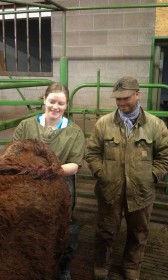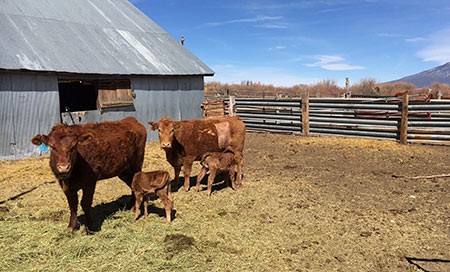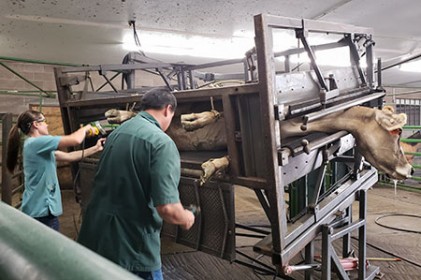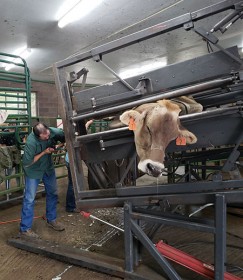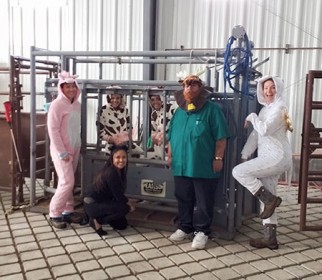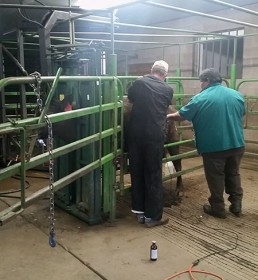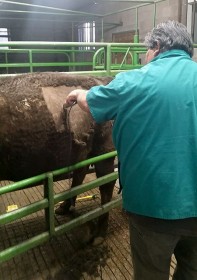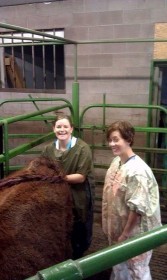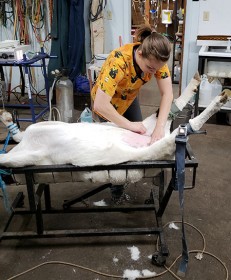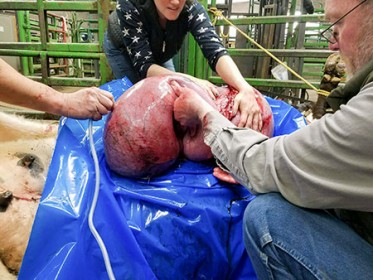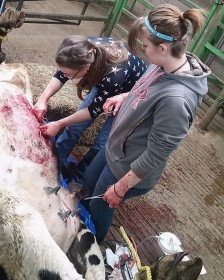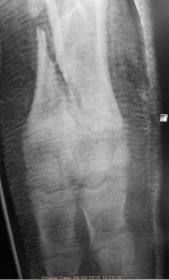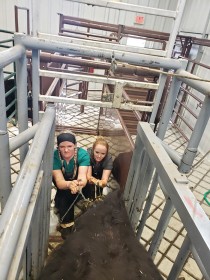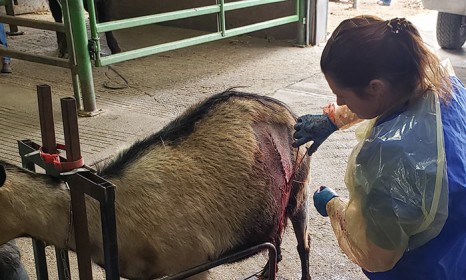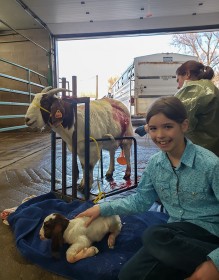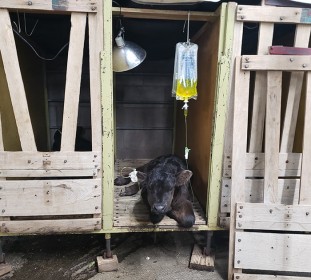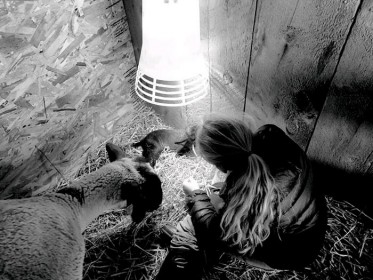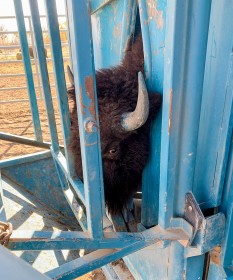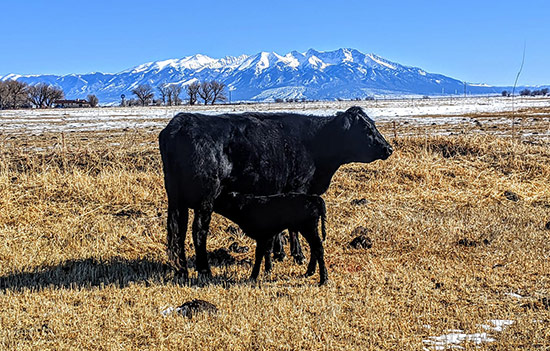Here at Alpine Veterinary Hospital, we pride ourselves on having high quality, top of the line medical and surgical treatment of all animals. We service cattle, sheep, goats, llamas, alpacas, poultry, and pigs.
Ambulatory Field Service
Our ambulatory trucks are fully stocked to make on-site farm calls so we can bring the medicine to you!
Haul-in Facilities
Both hospitals boast sorting pens, alley ways, and chutes to work cattle efficiently and safely. We have a state-of-the-art hydraulic chute system in the Monte Vista hospital for all mature bull work, as well as a tilt-table for any bovine orthopedic needs.
There are calving stalls with head catches at both hospitals as well for dystocias and cesarean sections.
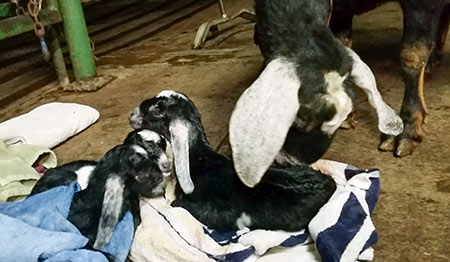
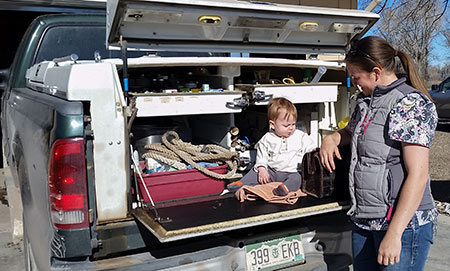
Examinations
We examine all vital signs (pulse rate, temperature, and respiratory rate), rumen motility and contractions, udder health, reproductive organs, teeth and gums, eyes, limbs and hooves, and overall body condition as nutrition is (and should be) a large focus in these animals.
Testing and Vaccinating
Brucellosis is a reproductive disease seen mainly in cattle and sheep. Brucella abortus, or Bang’s, vaccines are required in all female cattle under the age of 12 months and must be administered by any one of our USDA accredited veterinarians. Many ranchers will schedule to Bang’s vaccinate their heifers in late fall to late winter.
Tritrichomonas foetus is another reproductive disease seen in cattle that causes abortions. T. Foetus has to be tested for in all bulls sold for the purpose of reproduction as well as for any bulls being grazed on BLM or US Forest Service permits. Trich testing has to be performed by any one of our USDA accredited veterinarians, and should be done with all bulls on a yearly basis (even within private herds).
Tuberculosis and Johnne’s Disease are two additional diseases that may be tested for by a USDA accredited veterinarian.
Imaging: Radiography and Ultrasonography
Our mobile digital X-Ray and ultrasound machines are versatile and can be used in-house and in the field! Radiographs allow us to see things that we are unable to feel or see with the naked eye. Many diagnoses require the use of imaging such as claw (or toe) fractures or abscesses, broken legs, pneumonia in young animals, lumpy jaw, and more.
We use ultrasonography to evaluate both cattle and small ruminant pregnancy, as well as some disease processes.
We plan on being able to do whole-herd preg-checking via ultrasound in the near future.
Surgery
We are equipped to perform general field surgeries on many types of livestock including mass removals, castrations, enucleations, and caesarian sections.
Reproduction
We are able to evaluate bovine pregnancy through ultrasound and rectal palpation. Ultrasound pregnancy evaluation is most helpful at 30-120 days gestation, when aging and possible sexing, are most desired. Both ultrasound and rectal palpation are helpful in determining pregnancy status, health, and age and is also a great time of year to booster cows with annual vaccines. Dr. Crawford also offers laparoscopic AI (artificial insemination) in goats.
Our ambulatory truck allows us to make farm calls to assist in deliveries and difficult births, uterine and vaginal prolapses, and caesarian sections.
PAP Testing - NEW!
After training extensively with Dr. Tim Holt and Lisa Herrick, Dr. Curtis Crawford now offers top of the line PAP (pulmonary arterial pressure) testing on heifers, bulls, and cows. This test helps to screen for a condition that many of our high altitude cattle are at risk for called High Mountain Disease, or brisket disease. This is a heritable condition of the arteries supplying the lungs which causes them to become thickened at high altitudes. This, in turn, causes excessive strain on the heart, which leads to subsequent heart failure and death. Screening for this trait helps to improve genetic selection and overall herd health for our high altitude cattle. Dr. Crawford offers testing year round either at the clinic or on the ranch.
Post-mortem Examinations
Necropsies are a very important part of food animal medicine and whole herd health. If an animal dies, we may be able to help in preventing further deaths by examining the body and sending samples to laboratories for answers.
In-house Laboratory
We have blood machines that help us to evaluate multiple parameters in our small and large animals including CBC and Blood Chemistries. A CBC, or Complete Blood Count, assesses the animal’s white blood cells (infection fighting cells), red blood cells (oxygen carrying cells), and platelets (clotting cells). The Chemistry panels help us to evaluate the health of multiple organ systems including the liver and kidney.
Our doctors and veterinary technicians are also proficient at preparing microscope slides in order to evaluate blood and tissue smears, cytologies, bacterial samples, fecal floats, and more.
